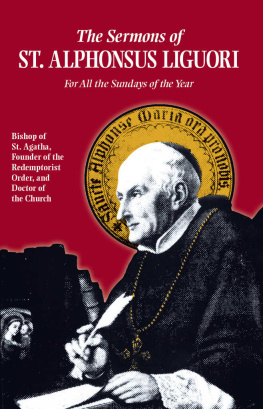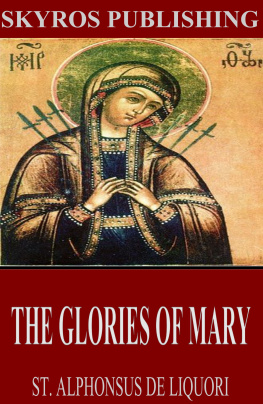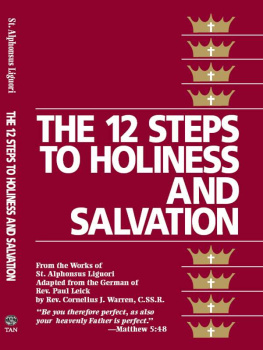The Sermons of
St. Alphonsus
Liguori
For All the
Sundays of the Year
St. Alphonsus de
Liguori
Photographically reproduced in 1982 from the 1852 edition by TAN Books.
Copyright 1982 by TAN Books.
Library of Congress Catalog Card No.: 82-050894
All rights reserved. No part of this book may be reproduced or transmitted in any form or by any means, electronic or mechanical, including photocopying, recording, or by any information storage or retrieval system, without permission in writing from the publisher.
TAN Books
Charlotte, North Carolina
www.TANBooks.com
2012
CONTENTS .

.
.
.
.
.
.
.
.
.
.
.
.
.
.
.
.
.
.
.
.
.
.
.
.
.
.
.
.
.
.
.
.
.
.
.
.
.
.
.
.
.
.
.
.
.
.
.
.
.
.
.
.
.
.
.
.
.
.
.
.
.
.
.
.
.
.
.
.
.
.
.
.
.
.
.
.
.
.
.
.
.
.
.
.
.
.
.
.
.
.
.
.
.
.
.
.
.
.
.
.
.
.
.
PROTESTATION.
In obedience to the decrees of Urban VIII., I protest that, of the miraculous works and gifts ascribed in this work to certain servants of God, and not already approved by the Holy See, I claim no other belief than that which is ordinarily given to history resting on mere, human authority; and that, in bestowing the title of Saint, or of Blessed, on any person not canonized or beatified by the Church, I only intend to do it according to the usage and opinion of men.
BULL
OF
THE CANONIZATION
OF
SAINT ALPHONSUS MARIA LIGUORI,
FOUNDER OF THE CONGREGATION OF THE MOST HOLY REDEEMER, AND BISHOP OF ST. AGATHA OF THE GOTHS.

GREGORY, BISHOP,
SERVANT OF THE SERVANTS OF GOD,
FOR A PERPETUAL REMEMBRANCE OF THE THING.

The Premium,
ACCORDING to the Apostle of Nations, sanctity and learning should so adorn a Bishop, to whose trust is committed the salvation of souls, that he may, by the most exemplary manner of life, serve as a light to guide his flock without stumbling on the road to eternal happiness, and also be able to exhort them in sound doctrine, and to convince the gainsayers. We learn from the history of every age, that there have been Bishops eminently entitled to this twofold praise, who, reflecting the image of the Good Pastor, and being made the pattern of the flock from the heart, devoted their exertions and wisdom to the promotion of its salvation; and who, like a candle placed upon a candlestick, shed a lustre over the Church of God, not less by the example of a most perfect life, than by the singular excellence of their doctrine.
A general commendation of the virtues & merits of Alphonsus.
2. For the purpose of furnishing his Church with a new example of such worthy Bishops in the last century, the Almighty appears to have given ALPHONSUS MARIA LIGUORI, who, having, from his tenderest years, carefully cultivated the Christian virtues, and having acquired a wonderful knowledge especially of sacred literature, was called to the very arduous office of the Episcopacy, that, in the field of the Lord, in which he had long since received the Priesthood and proved himself a laborious husbandman, he might labour with greater effect and advantage. Not content that his zeal for the increase of the glory of God should be confined within the narrow limits of his own life, he, in order to transmit to the remotest ages a series of successors in such a salutary work, instituted a society of Priests, who, inflamed with like charity, should devote to the salvation of souls all their care and exertions. It having been ascertained, after the eminent virtues of ALPHONSUS were examined with the wonted severity of judgment, that they had reached the highest summit of Christian perfection, and that no doubt could be entertained of the miracles by which Godthe Author of all goodhad attested the sanctity of his servant, we, in virtue of the Apostolical authority with which, though unworthy, we are invested by God, and with the advice not only of the Cardinals of the holy Roman Church, but of the Patriarchs, Archbishops, and Bishops, of whom a very great number were present in the city, decree and declare, by the present letters, that the honours of the Heavenly citizens are to be paid to the blessed ALPHONSUS LIGUORI by the universal Church, and that his intercession with God is to be implored.
The birth and early education of Alphonsus.
3. ALPHONSUS, descended of an illustrious race, was born in Naples on the 5th of the Kalends of October, 1696. Being endowed with wonderful activity of mind, he, on the termination of his childhood, applied himself successively to the study of the classics, of the more severe sciences, and of the law. He possessed such felicitous aptitude for learning, that he scarcely had entered on his sixteenth year, when, after a rigorous examination, he obtained, with distinguished applause, his degrees both in civil and canon law. Yielding to the wishes of his father, he applied all his attention to the study and practice of the profession of the law. Though he preserved his chastity and integrity in that avocation, nevertheless, the troubles and dangers by which it was beset induced him to abandon it and enter into the service of the Church. Wherefore, declining an offer of a high matrimonial connexion, and spontaneously and cheerfully transferring to his brother the paternal property, which descended to him as the eldest son, he cast away all care of human things.
He receives the Priesthood. The preservation of chastity his study. His wonderful lore of God and of his neighbour.
4. Having received holy orders, and being raised to the dignity of the Priesthood, he began to apply all his energy to extend on every side the glory of God, to sow the seeds of virtue in the minds of men, and to pluck up the roots of vice. Persuaded that the apostolical labours of no man can be productive of abundant fruit, unless he support his teaching by his example, it became a principal object of his care to exhibit himself by the practice of every description of virtue, "as a minister of God" and a "dispenser of His mysteries". Of chastity, which he had long since consecrated by vow to God, he was always the most faithful guardian, incessantly exerting all the powers of his mind and employing every movement of his body for the sole purpose of preserving it free from the slightest stain. To attain this object with perfect security, he confidently consigned that virtue to the care of the Mother of God. He was carried towards God with so vehement an impulse of love, that his attention was perpetually fixed upon Him; and nothing appears to have afforded him delight, but to think and speak of God. From the great fervour of his love for God, it is easy to conclude how ardent must have been the charity with which he burned for his neighbour. Hence, to recall men involved in vice and wickedness to the bosom and embraces of God, he never spared either toil or trouble. Hence it became his constant occupation to visit the hospitals for the purpose of assisting the sick, and of aiding by his presence those in particular who were in immediate danger of death. Hence it was that he accustomed himself to hear confessions with the greatest patience, and to spend in the performance of that function, not only whole days, but a considerable part of the night. Hence, too, was he in the habit of addressing from the pulpit his crowded audience in strains of such fervid language as to conquer and break down the obstinacy of abandoned sinners, and, by exhibiting to them the turpitude of the crimes which had hardened their hearts, to excite in the minds of his hearers such a lively sense of sorrow, as to move them to tears, and to fill, on various occasions, the sacred edifice with weeping and lamentations. Allowing himself, by day or by night, no intermission of the vast exertions, both of mind and body, which he made to procure the salvation of souls, he naturally became enfeebled and exhausted by incessant toil, and fell into a mortal malady, from which he was no sooner released by the Divine Power, than he immediately resumed with increased alacrity the performance of works of charity.
Next page







![St. Alphonsus Liguori - Visits to the Blessed Sacrament (with Supplemental Reading: Novena of Holy Communions) [Illustrated]](/uploads/posts/book/269658/thumbs/st-alphonsus-liguori-visits-to-the-blessed.jpg)


![Saint Alphonsus de Liguori - The Saint Alphonsus de Liguori Collection [30 Books]](/uploads/posts/book/134324/thumbs/saint-alphonsus-de-liguori-the-saint-alphonsus-de.jpg)

